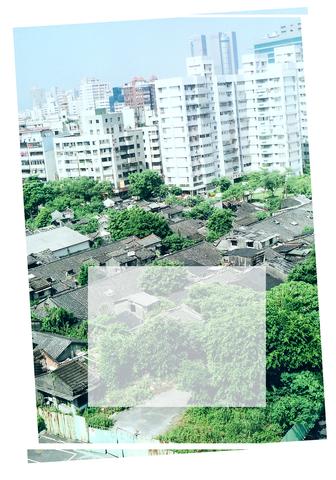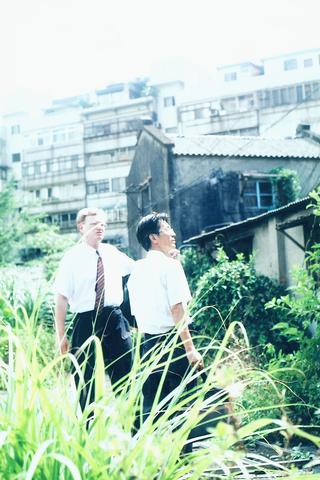Curtis Smith is an upset Canadian preservationist living in Taipei, and he's trying to impeach Taipei Mayor Ma Ying-jeou (
Smith and a group he helped form, called the Alliance to Make 44 South Village a National Relic (

Citing the recently bulldozed Yuanhuan (

PHOTO: DAVID FRAZIER
Former residents of 44 South Village, several of whom have allied with Smith, make the case for restoration on historical grounds. "What culture does Taiwan have left? Nothing," said Hsu Cheng-hu (
Hsu believes it is important to retain reminders of the arduous life in the early days of the KMT's arrival on Taiwan, especially given that period's enduring mark on the country's history, culture and identity.
"In Germany, they preserved the concentration camps," Hsu said. "I want our children and grandchildren to see the hard life of the mainlanders after they came over from China."
The Taipei City Government agrees with these preservationists, but only to an extent. City Hall's current plan calls for the restoration of four of the 10 buildings that remain standing in 44 South Village and the demolition of the other six to create a park.
More than just numbers
At present, the argument is whether to restore four buildings or all 10. So, what's Smith and his alliance so upset about?
Built between 1947 and 1949, the 44 South Village was Taiwan's first military settlement and housed technical workers brought to Taiwan with Chiang Kai-shek's (
Most who lived at 44 South Village worked across Hsinyi Road at the 44 Arsenal, an extensive complex inherited from the Japanese. Formerly, the arsenal took up what is now the Taipei World Trade Center, Taipei City Hall and several adjacent lots. The names of both the 44 Arsenal and the 44 South Village were derived from the 44 Arsenal that once existed in Qingdao (
The village has become a disputed artifact while also occupying one of the hottest pieces of real estate in Taipei. A stone's throw from the 1.3 hectares that remain of the village's original 2.8 hectare plot is the site of the NT$24-billion Taipei Financial Center, which will stand as one of Asia's tallest buildings.
Taking on City Hall
Since the military began divesting itself of the 44 South Village property in 1995, a storm of debate has arisen over what to do with the crumbling concrete structures. Preservationists have fought to preserve all of it. Others have wanted to flatten it into a public park. The adjacent Hsinyi Elementary School (信義國小) had its eyes on the land for athletic fields. Passions have flared over the issue to the point that one villager, Chang Li-cheng (張里成), slept with a meat cleaver and refused to leave before dying last year at 85.
Smith, who has now been walking by the 44 South Village on his way to work every day for most of the past eight years, took notice of the situation when village residents were being displaced into nearby apartment buildings about five years ago. In 1996 and 1997, he began garnering support for what would become the preservationist alliance, a loose-knit group of former villagers, scholars and architects.
The alliance got its first alarm when half the village was swiftly razed in April 1999, four months after Ma took office as Taipei mayor. Construction crews rolled in, leveled half of the by-then vacated village, and the elementary school built its long-desired athletic fields. Though slighted by that move, the preservation alliance chose to focus its efforts toward the preservation of the remaining buildings in the village.
"Ma met with Hsinyi Elementary School's principal between his election as mayor and his being sworn in, but he did not meet with anyone who wanted to preserve the village," said Tang Kuo-yan (
Nonetheless, Tang understands that the city holds no firm policy toward the village and that no laws had been violated. The executive decision to raze half the village also followed a redevelopment plan selected through open competition and judged by an independent panel of experts, including five scholars, one former villager and one area resident, who was opposed to complete preservation.
Tang had been invited by the city to organize the redevelopment plan competition, which ended on March 28, 1999, when Ma personally named the top three development plans in a ceremony at City Hall. The three plans all called for the preservation of 10 buildings in the village.
What really irks Smith and the preservationists is that since the competition, the three plans have been completely discarded in favor of plan which placed fourth in the competition. Even more maddening, they say, is that the man who submitted the fourth-place plan, Shih Chang-an (
Despite the cronyism involved in Shih's appointment, Lin's choice of plans is technically not illegal. "[The Taipei City Government] is not legally obligated to use the first-place plan. But in that case, why have the competition?" said Duan Yi-kang (
Tang and several of the scholars who were judges in the original competition have had similar reactions. "We get the feeling that the city government doesn't respect us, and now it's difficult to believe them when they say they will preserve even a little bit," said Tang.
Bulldozers on the horizon
A year and a half after the design competition of 1999, Taipei's Urban Planning Commission (
Looking for a friendly ear in the government, the preservationists then turned to the city's Bureau of Cultural Affairs (
Adding another layer to the wrangling over 44 South Village, members of the preservationist alliance also suspect numerous nefarious dealings between parties with invested interests in the site, though they've not yet been able to unearth hard proof to make a case. Hsu is still investigating the military's sell-off of village land and the relocation of its residents, who were given oddly varying subsidies with which to procure new housing.
"There were more than a dozen non-villagers who used the relocation plan to get apartments for free or very cheaply," he said. "But no one is willing to speak up about it."
He also cites the four mysterious fires that damaged village buildings. Such incidents are apparently not uncommon at military villages destined for demolition. Hsu said he suspects one of the fires was caused by an incendiary bomb of a make that is strictly military issue. Smith, who also believes the fires were intentional, has even posted notices around the site offering a NT$50,000 reward for any information leading to conviction in an arson case.
For all their theories, though, the preservationists have no firm targets for suspicion. "This is a valuable property," said Smith, "and there are just too many potential interests out there. There's the military, the way the zoning of one lot affects construction on nearby properties, and so many other things."
Meanwhile, one underplayed conflict in the 44 South Village affair appears to be whether or not people wish to preserve a reminder of what is often perceived as shameful. Chang Tien-chih (
Chang also has many valid points to back the building of a park, which he believes would be more useful to most area residents. He also points to the need to take action quickly, as the fenced-in 44 South Village lot is slowly becoming a garbage dump and sanctuary for stray dogs.
But at present, these arguments may all be moot, as the city is close to finalizing its plans for the future of the village. According to officials at the civil affairs bureau, a final decision to implement the present redevelopment plan could take place in August with construction beginning in October.
"It looks pretty grim," agreed Smith.
The same could also be said for his last-ditch effort of a motion to impeach the mayor. Speaking of the case, Duan said, "I don't think it will be of much use."
Still, neither he, nor Smith, nor Hsu is giving up. Duan hopes to garner support for allocating funds to preserve 44 South Village when City Council reconvenes on Aug. 20. This move, he hopes, has a slight chance of affecting city policy toward the site.
"We should preserve all of what's left and let people know," he said. "Leaving just a little doesn't have much meaning."

June 2 to June 8 Taiwan’s woodcutters believe that if they see even one speck of red in their cooked rice, no matter how small, an accident is going to happen. Peng Chin-tian (彭錦田) swears that this has proven to be true at every stop during his decades-long career in the logging industry. Along with mining, timber harvesting was once considered the most dangerous profession in Taiwan. Not only were mishaps common during all stages of processing, it was difficult to transport the injured to get medical treatment. Many died during the arduous journey. Peng recounts some of his accidents in

“Why does Taiwan identity decline?”a group of researchers lead by University of Nevada political scientist Austin Wang (王宏恩) asked in a recent paper. After all, it is not difficult to explain the rise in Taiwanese identity after the early 1990s. But no model predicted its decline during the 2016-2018 period, they say. After testing various alternative explanations, Wang et al argue that the fall-off in Taiwanese identity during that period is related to voter hedging based on the performance of the Democratic Progressive Party (DPP). Since the DPP is perceived as the guardian of Taiwan identity, when it performs well,

A short walk beneath the dense Amazon canopy, the forest abruptly opens up. Fallen logs are rotting, the trees grow sparser and the temperature rises in places sunlight hits the ground. This is what 24 years of severe drought looks like in the world’s largest rainforest. But this patch of degraded forest, about the size of a soccer field, is a scientific experiment. Launched in 2000 by Brazilian and British scientists, Esecaflor — short for “Forest Drought Study Project” in Portuguese — set out to simulate a future in which the changing climate could deplete the Amazon of rainfall. It is

The Taiwan People’s Party (TPP) on May 18 held a rally in Taichung to mark the anniversary of President William Lai’s (賴清德) inauguration on May 20. The title of the rally could be loosely translated to “May 18 recall fraudulent goods” (518退貨ㄌㄨㄚˋ!). Unlike in English, where the terms are the same, “recall” (退貨) in this context refers to product recalls due to damaged, defective or fraudulent merchandise, not the political recalls (罷免) currently dominating the headlines. I attended the rally to determine if the impression was correct that the TPP under party Chairman Huang Kuo-Chang (黃國昌) had little of a